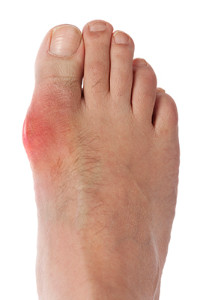 Even though many women enjoy wearing high heels and admire how the foot looks in high heeled shoes, there may be specific foot issues that may develop as a result of wearing this type of shoe. The ankles may become unstable, which may affect the body’s balance, in addition to providing inadequate support while walking. Research has shown that muscles may gradually reduce in length in the back of the leg and they may get longer in the front of the leg. These changes may affect the muscle strength in the leg and may influence overall body stability. If you choose to wear high heels, there may be techniques that can be implemented, which may minimize any injuries that may occur. These may include performing gentle stretching exercises, using resistance bands that may aid in strengthening the leg muscles, and using your toes to pick up small objects, which may help the muscles in the toes to become stronger. If you have questions about the effects high heels can have on your feet, it is suggested to speak with a podiatrist.
Even though many women enjoy wearing high heels and admire how the foot looks in high heeled shoes, there may be specific foot issues that may develop as a result of wearing this type of shoe. The ankles may become unstable, which may affect the body’s balance, in addition to providing inadequate support while walking. Research has shown that muscles may gradually reduce in length in the back of the leg and they may get longer in the front of the leg. These changes may affect the muscle strength in the leg and may influence overall body stability. If you choose to wear high heels, there may be techniques that can be implemented, which may minimize any injuries that may occur. These may include performing gentle stretching exercises, using resistance bands that may aid in strengthening the leg muscles, and using your toes to pick up small objects, which may help the muscles in the toes to become stronger. If you have questions about the effects high heels can have on your feet, it is suggested to speak with a podiatrist.
High heels have a history of causing foot and ankle problems. If you have any concerns about your feet or ankles, contact one of our podiatrists from Canonsburg Podiatry Associates. Our doctors can provide the care you need to keep you pain-free and on your feet.
Effects of High Heels on the Feet
High heels are popular shoes among women because of their many styles and societal appeal. Despite this, high heels can still cause many health problems if worn too frequently.
Which Parts of My Body Will Be Affected by High Heels?
- Ankle Joints
- Achilles Tendon – May shorten and stiffen with prolonged wear
- Balls of the Feet
- Knees – Heels cause the knees to bend constantly, creating stress on them
- Back – They decrease the spine’s ability to absorb shock, which may lead to back pain. The vertebrae of the lower back may compress.
What Kinds of Foot Problems Can Develop from Wearing High Heels?
- Corns
- Calluses
- Hammertoe
- Bunions
- Morton’s Neuroma
- Plantar Fasciitis
How Can I Still Wear High Heels and Maintain Foot Health?
If you want to wear high heeled shoes, make sure that you are not wearing them every day, as this will help prevent long term physical problems. Try wearing thicker heels as opposed to stilettos to distribute weight more evenly across the feet. Always make sure you are wearing the proper shoes for the right occasion, such as sneakers for exercising. If you walk to work, try carrying your heels with you and changing into them once you arrive at work. Adding inserts to your heels can help cushion your feet and absorb shock. Full foot inserts or metatarsal pads are available.
If you have any questions please feel free to contact our office located in Canonsburg and McMurray, PA . We offer the newest diagnostic and treatment technologies for all your foot and ankle needs.



